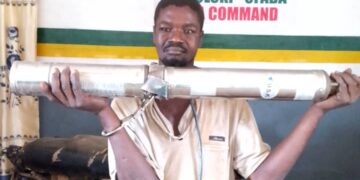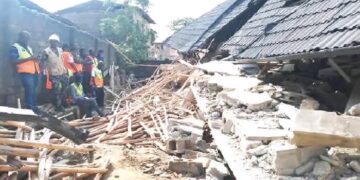Ogun State Commissioner for Environment, Hon. Ola Oresanya, has disclosed plans by the state government to establish a new agency that will serve as an environmental watchdog.
The agency will be saddled with the responsibility of enforcing sanitation laws, maintaining public infrastructure, and curbing environmental abuse by residents.
Speaking exclusively on Frontline, a current affairs programme aired on Eagle 102.5 FM, Ilese-Ijebu, Oresanya said the creation of the agency is part of broader proactive efforts by the state to prepare for flash floods, following a warning issued by the Nigerian Meteorological Agency (NiMet), which listed Ogun among sixteen states likely to experience flooding.
“We’ve started already,” Oresanya said. “We have a task force. We have policies. We have laws. The next step is putting structures in place to ensure compliance. That is where enforcement comes in. We are going to fund this project, purchase Black Maria vehicles, recruit personnel, and focus strictly on sanitation and infrastructure maintenance.”
He explained that Ogun State had received an earlier alert in February, with a follow-up update issued on April 18. The government, he said, immediately directed all local councils to circulate the information to Community Development Associations (CDAs) and Community Development Councils (CDCs) down to the street level.
Oresanya listed several flood-prone areas in the state, including Alamutu in Abeokuta, Shokori River Area, Ifo LGA, Orudu River, Oke-Ofa, Iju Area, Itaoshin, Olomore, Oparo, Banku Area, Odo Musa, and Alakonga. He confirmed that construction works are ongoing to combat flooding, especially in Ijebu-Ode, where erosion has been a major concern.
He recalled a 1984 tremor in Ijebu-Ode that dried up underground water, destabilizing the soil and triggering sinkholes and landslides, with 16 active erosion sites now identified in the area. He described the erosion crisis not just as a state problem but as a national ecological emergency, with Ilese earmarked as a priority zone for intervention.
On funding, Oresanya clarified that his ministry doesn’t receive direct allocations. Instead, projects are executed by national agencies while the ministry monitors implementation. “We don’t operate like other ministries with direct access to funds. We must keep lobbying to make sure key projects are implemented,” he said.
Addressing personal challenges in office, the commissioner said, “I am my greatest challenge. I am responsible for my actions. Funds or not, you must be creative. Don’t promise what you can’t fulfill. I define what is doable and get it done.”
He also spoke on waste management, describing it as both a sanitation and security matter. “Sometimes, we find strange items, even dead bodies, in waste bins. It’s disturbing. But if you have your refuse container at home, your waste tells your story. It helps the community understand its members better.”
He encouraged residents to take ownership of their refuse, adding that they have the legal right to sue local authorities or the Ogun State Waste Management Agency (OGWAMA) if waste is persistently uncollected.
On plastic waste, Oresanya said Ogun would not copy Lagos in banning plastic use. Instead, he emphasized that neither plastic nor paper should end up on the streets. The state, he added, is working to convert waste into fuel and create jobs in the process.
The commissioner cautioned against illegal road digging and urged the public to report such activities. He also acknowledged the poor state of some health facilities affected by flooding, citing the health centre in Ilese-Ijebu as one of the areas being reviewed for urgent attention.
He concluded by urging residents to embrace the mantra “If you see something, say something” and report any environmental violations. He provided a direct contact number—+234-901-048-0056—for residents to send messages or images via WhatsApp to alert authorities of abuses in their communities.

























